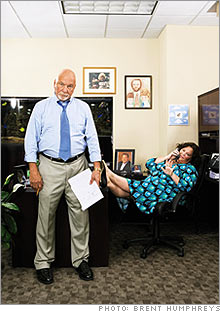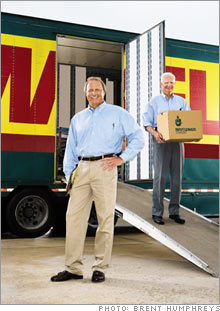Working for your kidsMore and more retirement-age executives are taking jobs at their children's companies. How families are becoming co-workers without anyone having to take a time-out.(Fortune Magazine) -- Imagine you're the 64-year old retired CEO of a manufacturing company. Would you carry a pink business card with a tiny photo of a pug named Wheezie on it? What if your boss said you had to? What if, moreover, your boss was your 28-year-old daughter? Robert Shipman carries that card. The pug in question is the mascot of a cosmetics company called the Balm that his daughter Marissa, now 33, started in 2003. At first Shipman - who had sold his clothing manufacturing company that had $130 million in annual sales and retired in 1980 - balked at both the pink and the pug, but then he relented.
"We disagree on a lot of things, but I usually give in, because I'm amazed at her talent," he says of his elder child. (Her younger sister, Jordana, now works for the Balm too.) "She's created a product line with a national market. That isn't easy to do. I bow down to that." Smart move. Going to work for one of your kids, as more and more retirement-age executives are doing, is a challenge. It requires a huge psychological shift on both sides, and experts say that many an enterprise has gone down in flames because parents and their children can't shed old habits and adopt new, businesslike roles. "The biological model is, the parent instructs and makes decisions for the kids. Reversing that is swimming against the tide of 10,000 years of human evolution," says Wayne Rivers, CEO of the Family Business Institute, a research and consulting firm in Raleigh. For a grown child, managing Mom or Dad can be fraught with issues too: What if you have to (gulp) fire a parent? Most entrepreneurs with a parent in their employ admit to experiencing déjà vu, especially if the employee is also a stockholder. Because her dad owns 25% of her company, Marissa Shipman says, "sometimes when I need to spend money to launch a new product, it reminds me of being a kid asking him for my allowance." When Laine Caspi started a baby-products company called Parents of Invention in 2002, her father, Doug Harmon, had recently retired from a 37-year career as a systems engineer and IT manager at IBM, Citigroup, and Merrill Lynch. He pitched in to help Caspi get her books in order. "When Dad got into the business, I sent him a big box full of eight months' worth of sloppy financial records with lots of important documents missing," she says. Harmon straightened out the mess with nary a word of complaint, but, Caspi recalls, "I felt like a bad girl who hadn't cleaned her room." For about a year, every time she asked Harmon to do something, Caspi recalls, "it was like being back in high school asking for the car keys. But I got over it." Unlike in the movie Freaky Friday, there are no magic fortune cookies to speed the adjustment process along. The surest way to avoid turning the workplace into dysfunction junction is to follow a few tested strategies. Define roles This approach worked well for Steve Lancashire, who bought a Mayflower moving franchise in Austin in 1995 and changed its name to American Relocation Systems. Lancashire hired his father, Ben, a retired CEO of Inland Container Corp., and put him in charge of payroll, accounting, taxes, insurance, and long-term financial strategy. "I knew the moving business," says Lancashire the younger, a former Mayflower executive, "but I really needed his expertise on everything else." Says Ben Lancashire: "The natural tendency, especially for someone with my corporate background, is to try to take charge. But I backed off and stuck to my part of it. Now I rarely challenge his decisions. He has some pretty darn good ideas." Ask strategic questions Plenty of parents know they need to back off and let the kid run the company, but they just don't know how. Ira Bryck, director of the Family Business Center at the University of Massachusetts at Amherst, recommends learning a new way of making suggestions that he calls strategic questioning. "Lots of people already have a parent's blaming, critical voice inside their heads. They don't need to hear that voice from an employee at work every day," he says. If a child is about to do something a parent thinks is boneheaded, Bryck says he should refrain from saying, for example, "For crying out loud, that will never work!" Instead ask strategic questions like "Can you tell me how you see that fitting into your overall strategy?" or "Have you thought about [insert perceived problem here]?" The alternative, alas, can get nasty. Wayne Rivers of the Family Business Institute coached one business owner who was so sick of his dad's domineering ways and so unable to confront the old man that if he saw his dad's car in the company parking lot "he'd just keep driving," says Rivers. "He'd usually head for the golf course, where he could whack away at little balls all day." (Paging Dr. Freud, Dr. Sigmund Freud ...) Not surprisingly, with the nominal boss AWOL most of the time, the business nearly went under. The deadliest power struggles, it seems, occur between fathers and sons. Joseph Astrachan, director of the Cox Family Enterprise Center in Kennesaw, Ga., notes that a substantial body of academic research shows that "fathers and daughters generally make great business partners, because they aren't in competition. Daughters want their dads to stay heroic. They are aiming to protect that image, both in their own minds and in their fathers' minds. Sons are different. Sons want to replace their fathers as heroes." When the Oedipus myth plays out in a family business, and neither father nor son is willing to give an inch to the other, says Astrachan, "I've seen conflicts that have destroyed both the business and the family, a total blowup." Plan for conflict Some families work out private code words for defusing the stress of an argument. "There are times when we get pissy and frustrated with each other and the conversation just feels like it's going all wrong," says Doug Harmon. "Then usually one or the other of us will yell, 'Keeee-YAH!' That's our signal to back off, cool down, and maybe even laugh about it." Adds daughter (and boss) Laine Caspi: "We got that from my son, who learned it in a martial arts class. It's what you yell before every blow." Others invite a third, neutral party into their donnybrooks. "Whenever we have a big disagreement, we try to be very professional about it, but we're Italian," says Hank Datelle. "We get mad and yell and scream for 15 minutes, and then it's over and forgotten." Datelle, 65, began his career at IBM and then started three successful Internet companies. In 2001 his daughter Lisa, 36, who had been working for a big pharmaceutical benefits-management company, decided to start her own firm, Cypress Care, to compete with her former employer. At first Cypress Care operated out of the basement of Lisa's house in an Atlanta suburb. She persuaded her father to come aboard, along with her brother Marc, 38, an information-technology and finance whiz. Says Hank: "I researched the field and realized that Lisa was right about what was lacking in the industry. With my startup experience, I figured I could help." So he bankrolled the venture, now a $200 million company with 150 employees. The Datelles hired a moderator, in the form of a chief operating officer who is no relation, to make sure that their arguments did not lead to bad decisions. Says Lisa: "My dad knows more than I do about some things. And I know more than he does about other things. So we've made an effort to hire people who know more than either of us." In the event of an impasse, the COO casts the deciding vote. Lose the ego As any boss knows, giving somebody a lousy performance review is hard - so hard that many studies show that the majority of corporate managers, if they have a choice, avoid those conversations altogether. Now just imagine having to tell your mom or dad that his or her work is simply not good enough. Says Mike Johnston, 40, who hired both his retired parents to work at Savory Spice Shop, his gourmet spice business with stores in Denver and suburban Littleton: "It's really hard to tell your mom or dad what to do, or to give them constructive criticism. They're your parents. We've had some difficult conversations." Obviously, having your kid pick apart your work is no day at the beach either. As in so much else, humility helps. As Johnston's dad, Charlie, 65, puts it, "I made up my mind at the outset that Mike knows spice. What he says goes." Set benchmarks Having performance objectives from the get-go can make a huge difference. Andrew Keyt, executive director of the Loyola University Chicago Family Business Center, often gets called in to help entrepreneurs give performance reviews in sensitive situations. "If goals are marked out in advance," he says, "then negative feedback becomes much easier on both sides, because it's not personal." What if worst comes to worst and your child decides your services are, um, no longer required? Rivers of the Family Business Institute says that firing a parent is so traumatic for most business owners that "it really can't be done in one brief meeting, as you probably would fire any other employee. It's a process that generally takes four or five months." If you work for a son or daughter, and if he or she has been gradually taking projects away from you and encouraging you to take more vacation time, guess what? You're probably being eased out of your job. Have an exit strategy Ben Lancashire is gradually stepping aside after almost 12 years of working for son Steve's moving company. "He's learned a lot about general management," says the elder Lancashire, who is 78. "I can play more of an occasional consulting role now." Hank Datelle plans to stay with Cypress Care for two more years - it's part of the deal he and Lisa made with private-equity investors who bought 70% of the company last summer - and then go work on his golf game or (who knows?) maybe start another company. Laine Caspi has hired a chief financial officer to replace her dad, who's training the new person, because her parents will be moving to Mexico in August. Why? "We like it there," says Dad. "I'm ready to get back to retirement and relax." Parents of Invention, Caspi's company, has grown 100% a year every year since 2003 and has expanded its product line from one item, a baby carrier called the Ultimate Babywrap, to about 20. Caspi says that without her dad's support, she would have had to abandon the business in its infancy. "All entrepreneurs go through these dark days where you just think you are crazy to believe your business will ever take off. When I was really down, I called my dad and said, 'This company will never succeed,'" she recalls. "He said, 'Are you having fun with it?' And I said, 'Well, most of the time, yes.' He answered, 'Then you're already a success.' That picked me up and kept me going." Then again, that pep talk sounds very much like a dad and not very much like a CFO. |
| ||||||||


